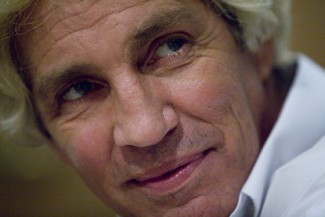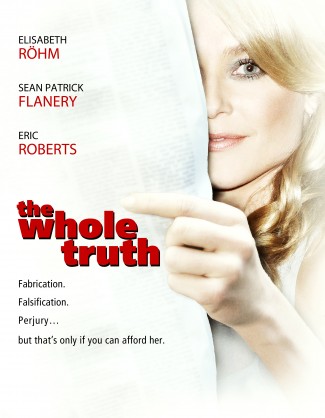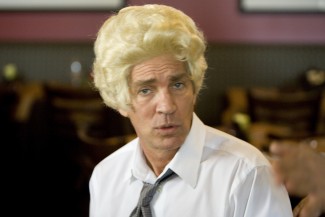Eric Roberts speaks ‘The Whole Truth’ and nothing but the truth

Eric Roberts is a busy man.
The Academy Award-nominated actor has been in show business for 35 years, and in recent years he seems to be working more than ever. Ascribing to the philosophy that “quantity” sometimes beats out “quality,” Roberts can be found on a working set up to 200 days a year. One of his most recent projects is The Whole Truth, a comedy about coaching criminal defendants to persuade juries, written and directed by Colleen Patrick. In the film, which also stars Elisabeth Röhm, Sean Patrick Flanery and Rick Overton, Roberts plays a Russian mobster with an ill-fitting blond wig.
Roberts said that during the project he became a fan of Patrick’s. “I love woman directors,” he said recently during a phone interview. “She was great to work for, and she had her stuff together. And Elizabeth Röhm was funny, and I didn’t expect that because I know her — excuse me for the terminology — but I know her from being a drama queen. And she’s just great in this movie.”
The role is a slight departure from Roberts’ usual fare. The actor has earned his industry credibility for creating iconic dramatic roles, while comedy has always been an afterthought. “I am not innately funny,” he said. “I mean I can be funny if I have funny dialogue, but I am not innately funny. But my sidekick was Rick Overton, who is innately funny, and he basically took care of me in this movie. If I’m at all amusing, it’s thanks to Rick Overton in this movie.”

Roberts said it takes a little more skill to master comedic timing. “I can cry and die all day, but to make you laugh is an effort,” he said. “I have to approach it through the character, but I had a great character in this, a Russian mobster. And Rick Overton and I play Russian idiots who get in big trouble, and we had so much fun together.”
He added later: “When you have a blond wig that doesn’t fit, that says many things about your taste and your intelligence. And that in itself will draw parameters of who you’re playing.”
Speaking during the recent blizzard that hit the Northeast, Roberts’ mind seemed never too far from his stepson’s recent success in the music industry. He quickly jumped from promoting his own movie to promoting “Beautiful Pain,” the new iTunes single from Keaton Simons, his stepson of many years. “It’s just about to happen for him,” he said. “We’re so proud that we can’t see straight.”
With his many years in the business comes a sense of understanding Hollywood from the inside out. One thing Roberts said he’s learned is that the movie-making business needs more female directors. “We need more women filmmakers, because we need the feminine sensibility,” he said. “Men have been screwing up the planet for 2,000 years, and if women ruled a little more of the planet, it would be a nicer place.”
The Russian mobster in The Whole Truth is one of many characters he’s portrayed in recent years. One look at the actor’s resume can be dizzying. He said there’s good reason for the plethora of work, and it all dates back to losing the Academy Award in 1986 for Runaway Train.
“When I first became a movie star in 1978, I was offered three-picture deals by Paramount and by Dino [De Laurentiis] and by a couple of other countries,” he said. “And I turned them all down with the advice of my then-manager because I was an artist who was not going to sell out to the Hollywood mainstream.”

He eventually came to the realization that a successful movie star is not necessarily one with fame and fortune (although those don’t hurt). It’s that other f-word that’s the ultimate goal: freedom.
“So I made one movie a year because that’s what you’re supposed to do as the mainstream movie star, one movie a year so you leave your audience hungry to see you again,” he said. “Up until they gave my Academy Award to Don Ameche, and I realized sometimes it’s quantity over quality. So I called my agent that next day, and I said, ‘I will do anything anywhere because I can’t stand not working eight months of the year. So I will do anything anywhere if there’s one good thing about it. That’s a good script, a good co-star, a good director, a good wardrobe, a good location. Whatever it is, I’m in, because I don’t want to stop working up until I retire.’”
He ascribed to that school thought ever since.
“Since that day, I have worked basically 200 days a year every year, made an incredible amount of movies, have had an incredible amount of fun, and have seen the world for free.”
By John Soltes / Publisher / John@HollywoodSoapbox.com

